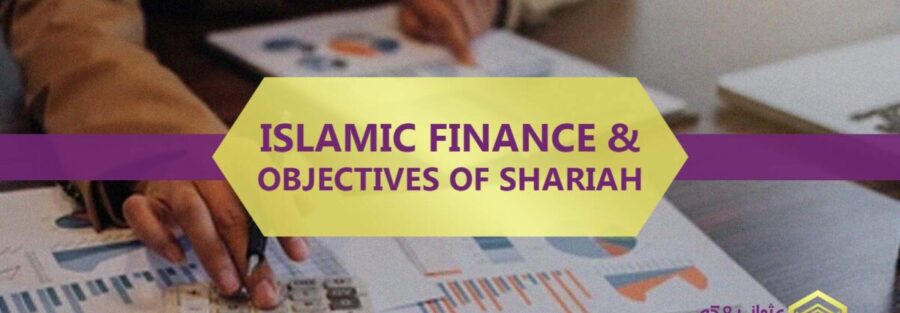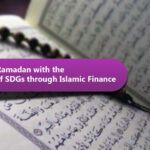Finance and money make such a huge part of our life on individual and societal level. There are two common financing infrastructures being practised worldwide: Conventional Finance and Islamic Finance. Riba (Interest) is the backbone of Conventional Finance. Although, the Western world has designed infrastructure of Conventional Finance, they do believe it is a greedy and inhumane system. According to the International Monetary Fund (IMF), Islamic banks were more robust than traditional banks during the 2008 Global Financial Crisis. Now many international banks like HSBC and Citi Bank offer Islamic window.
Islamic Finance is based on the rules of Shariah. Shariah prohibits financial activities based on Riba (interest) and Gharar (uncertainty) and so on. Islamic Finance encourages entrepreneurship, mutual contracts which connect capital owner with real economic activities that contribute to the welfare of society. Whereas Riba and Gharar will lead society towards unjust system, which is a root cause of corruption. Islam does not restrict anyone from wealth creation, wealth management or from wealth accumulation but there are certain rules known as Islamic laws or Shariah laws. There are Illahs and Hikmas behind Shariah laws, collectively known as Maqasid al-Shariah (Objectives of Shariah). Maqasid al-Shariah means to achieve par excellence in this world and in the Hereafter by restricting ourselves from Haram (prohibited) activities like Riba and Gharar, creating transparency and equilibrium in society. Allah (SWT) says:
O BELIEVERS! DO NOT DEVOUR ONE ANOTHER’S WEALTH ILLEGALLY, BUT RATHER TRADE BY MUTUAL CONSENT. MOREOVER, DO NOT KILL EACH OTHER OR YOURSELVES. SURELY, ALLAH IS VERY MERCIFUL TO YOU.
[QURAN 4:9]
Shariah or Islamic law is a way of life that is why the Islamic Scholars came out with their interpretations based on the Qur’an and Sunnah in their attempt to link the dots between Maqasid al-Shariah and contemporary practices.
MAQASID AL-SHARIAH
1: PROTECTION OF FAITH
As per Shariah, protection of faith is the basic need because we Muslims believe that this worldly life is a test; our ultimate destination is the Hereafter. Faith is the core element of the Five Pillars of Islam. Poverty can distant a Muslim from his faith. Holy Prophet Muhammad (peace be upon him) taught us a supplication:
O ALLAH! I SEEK REFUGE IN YOU FROM DISBLIEF (IN YOU), POVERTY, AND TORMENT IN THE GRAVE.
[SUNAN AN NASAI]
2: PROTECTION OF LIFE
Islam is a religion of peace and it promotes humanity in every aspect. Life is a blessing of Allah (SWT) and murder, suicides are strictly prohibited (Haram) in Islam as it leads society towards transgression. A wide number of deaths occur worldwide due to poverty, as many of us around are unable to have clean water, food, and even many parents cannot afford the vaccination of their newborn which could lead to their death. Allah (SWT) says:
WHOSOEVER KILLS AN INNOCENT HUMAN BEING, IT SHALL BE AS IF HE HAS KILLED ALL MANKIND, AND WHOSOEVER SAVES THE LIFE OF ONE, IT SHALL BE AS IF HE HAD SAVED THE LIFE OF ALL MANKIND.
[QURAN 5: 32]
As per research statistics in an article “Poverty and Suicide” in the Journal of Global Mental Health, 75% of suicide cases occur due to poverty in low- and middle-income countries.
3: PROTECTION OF PROPERTY
Islamic teaching has its own perspectives and concept on wealth. Muslims believe that everything in this life belongs to and come from one and only God, Allah. Humans are not the absolute owner of the wealth. The only real owner of everything including wealth is Allah. All the resources we have is just a trial of a temporary world to please Allah (SWT).
YOUR WEALTH & YOUR CHILDREN ARE ONLY A TRIAL, BUT ALLAH ‘ALONE’ HAS A GREAT REWARD (PARADISE)
[QURAN 64:15]
Islam does not forbid anyone from wealth accumulation as it is compliant with Shariah law. Conventional finance only teaches wealth management which focuses on investment, wealth formation and accumulation but Islamic Finance also emphases upon wealth purification by its distribution in the form of Charity (Zakat, Sadqah and Khairat). According to Islamic teachings wealth should not be accumulated in few hands, the fortunate wealthy must be dutiful and helpful towards the under privileged.
VERILY, THOSE WHO GIVE SADQAAT (i.e. ZAKAT & ALMS etc.), MEN AND WOMEN, AND LEND TO ALLAH A GOODLY LOAN, IT SHALL BE INCREASED MANIFOLD (TO THEIR CREDIT), AND THEIRS SHALL BE AN HONOURABLE GOOD REWARD (i.e. PARADISE).
[QURAN 57: 18]
According to Holy Prophet Muhammad (peace be upon him):
GIVE CHARITY WITHOUT DELAY, FOR IT STANDS IN THE WAY OF CALAMITY [TIRMIDHI]
We can protect property through encouragement of trade and investment as it stimulates economic growth and decreases unemployment and individual dependency on the state. This is one of the things that helps maintain and retain wealth. Circulation of money is very crucial for the economy to thrive, flowing from those who have it, to those who need it in return for products, services, or benefit through trade. Allah (SWT) says:
IN ADDITION, COME NOT NEAR TO THE ORPHAN’S PROPERTY, EXCEPT TO IMPROVE IT, UNTIL HE (OR SHE) ATTAINS THE AGE OF FULL STRENGTH; AND GIVE FULL MEASURE AND FULL WEIGHT WITH JUSTICE. WE BURDEN NOT ANY PERSON, BUT THAT WHICH HE CAN BEAR. MOREOVER, WHENEVER YOU GIVE YOUR WORD (I.E JUDGE BETWEEN MEN OR GIVE EVIDENCE, ETC.) SAY THE TRUTH EVEN IF A NEAR RELATIVE IS CONCERNED, AND FULFILL THE COVENANT OF ALLAH, THIS HE COMMANDS YOU, THAT YOU MAY REMEMBER.
[QURAN 6: 152]
4: PROTECTION OF DIGNITY
Allah (SWT) has created human beings as a superior creature. To protect the dignity Allah (SWT) has beautifully designed hierarchy of relationships among human beings. Every relationship has its own rights and duties. For charity, it is mandatory to give preference to your relatives because poverty can easily divert a person towards unethical or immoral acts. Allah (SWT) says:
AND WE BESTOWED DIGNITY ON THE CHILDREN OF ADAM AND PROVIDED THEM WITH RIDES ON THE LAND AND IN THE SEA, AND PROVIDED THEM WITH A VARIETY OF GOOD THINGS AND MADE THEM MUCH SUPERIOR TO MANY OF THOSE WHOM WE HAVE CREATED
[QURAN 17: 70]
5: PROTECTION OF INTELLECT
Mind or intellect is a powerful asset. Poverty can seriously damage the intellect; it causes severe depression and divert the man’s focus from his real purpose of life. Damage of the intellect can be unhealthy towards society and give rise to unethical practices. It is mentioned in a report by the World Health Organisation (WHO) that poverty is a major contributor to mental illness, stress, suicide, family disintegration and substance abuse.
THE LAST WORDS
Like every other aspect of life, Islam teaches us about financial dealings from wealth creation to distribution in the light of the Holy Quran and Sunnah. By managing finances with respect to Shariah rulings, we can achieve success in this world and the Hereafter.
About the author: Saman Mehmood is currently a student of Master of Commerce specializing in Islamic Finance at Jinnah University for Women and is a novice in the finance industry. She has a keen interest in growing into the field of Islamic Finance.



